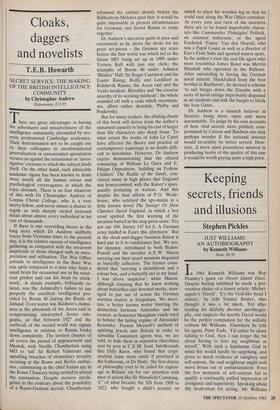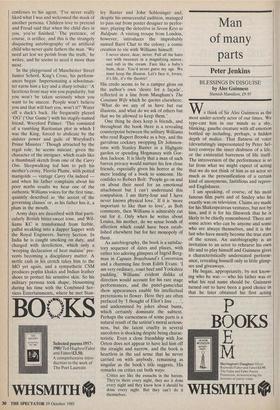Keeping secrets, friends and illusions
Stephen Pickles
JUST WILLIAMS: AN AUTOBIOGRAPHY by Kenneth Williams
Dent, f8.95
In 1961 Kenneth Williams was Roy Plomley's guest on Desert Island Discs. Despite feeling inhibited he made a pro- vocative choice of a luxury article: Michel- angelo's 'David'. 'It's the God-like head I admire,' he tells Stanley Baxter, who thought it was a bit much. Yet after reading his skilfully discreet autobiogra- phy, one suspects the marble David would be the perfect companion for the wilfully celibate Mr Williams. Elsewhere he tells his agent, Peter Eade, 'I'd rather be alone talking to God, then I can forget the bit about having to love my neighbour as myself.' With such a handsome God in mind this would hardly be surprising, and given so much evidence of vainglory and self-esteem, the said neighbour might well move house out of embarrassment. Even the few moments of self-analysis fail to qualify a continually puffed impression of arrogance and superiority. Speaking about the motivation for acting, Mr Williams
confesses to his agent, 'I've never really liked what I was and welcomed the mask of another persona. Children love to pretend and Freud said that when the child dies in you, you're finished.' The pretence, of course, is artifice, and this is the strangely disquieting autobiography of an artificial child who never quite fathers the man. 'We need art lest we perish from the truth,' he writes, and he seems to need it more than most.
In the playground of Manchester Street Junior School, King's Cross, his perform- ances began. Impersonating a schoolmas- ter earns him a key and a sharp rebuke: 'A facetious front may win you popularity, but you won't be taken seriously when you want to be sincere. People won't believe you and that will hurt you, won't it?' Water off a duck's back. He frequently played `OG' (`Our Game') with his stagily-named friend, Wreyford Palmer. 'This consisted of a rambling Ruritanian plot in which I was the King, forced to abdicate by the sinister power and guile of Wreyford's Prime Minister.' Though attracted by the regal role, he seems miscast, given the character of the intriguer, which reads like a thumbnail sketch from one of the Carry Ons. Sleepwalking led him to pelt his mother's crony, Florrie Plume, with potted marigolds — vintage Carry On indeed — and when his father complains about his poor maths results we hear one of the authentic Williams voices for the first time, quaintly described as 'the accent of the governing classes' or, as his father has it, a plum in the mouth.
Army days are described with that parti- cularly British bitter-sweet tone, and Wil- liams KC is transformed from feeble, pallid weakling into a dapper Sapper with the Royal Engineers, Survey Section. In India he is caught smoking on duty, and charged with dereliction, which only a `weeping declaration of heat malaise' pre- vents becoming a disciplinary matter. A nettle rash in his crotch takes him to the MO yet again, and a sympathetic CSM produces poplin khakis and Indian leather shoes to protect his sensitive skin. So his military persona took shape, blossoming during his time with the Combined Ser- vices Entertainments, where he met Stan-
ley Baxter and John Schlesinger and, despite his unsuccessful audition, managed to pass out from poster designer to perfor- mer, playing the detective in Seven Keys to Baldpate. A visiting troupe from. London, however, introduces the improbably named Barri Chat to the colony, a comic creation to vie with Williams himself: I never shave, dear, never. Pull all the hairs out with tweezers in a magnifying mirror, and rub in the cream. Face like a baby's bum, dear. You'd never guess my age. We must keep the illusion. Let's face it, lovies, it's life, it's the theatre!
His credo seems to be a camper gloss on the author's own 'desire for a facade', reflected in a line from Maugham's The Constant Wife which he quotes elsewhere: `What do we any of us have but our illusions, and what do we ask of others but that we be allowed to keep them.'
One thing he does keep is friends, and throughout the book there is a revealing counterpoint between the solitary Williams who read Rupert Brooke as a boy, and the garrulous cockney swopping Dr Johnson- isms with Stanley Baxter in a Highgate garden or spending Hogmanay with Gor- don Jackson. It is likely that a man of such barren privacy would nurture his few close friends, especially given his horror at the mere lending of a book to someone. He confides to Robert Bolt: 'People go on and on about their need for an emotional attachment but I can't understand this compulsion. I am thirty-four and I have never known physical love.' If it is 'more important to like than to love', as Bolt comments, then Williams is admirably cut out for it. Only when he writes about Louisa, his mother, do we sense bonds of affection which could have been estab- lished elsewhere but for her monopoly of them.
As autobiography, the book is a satisfac- tory sequence of dates and places, with rather too adoring glimpses of Ingrid Berg- man in Captain Brassbound's Conversion and a charming line from Edith Evans: 'I am very ordinary, roast beef and Yorkshire pudding.' Williams' evident dislike of direction would account for his rare stage performances, and the panel-game/chat show appearances enable his intellectual pretensions to flower. Here they are often prefaced by 'I thought of Eliot's line . and undermined by jokes about bums, which certainly dominate the subtext. Perhaps the earnestness of some parts is a natural result of the satirist's moral serious- ness, but the latent cruelty in several anecdotes is shocking despite being charac- teristic. Even a close friendship with Joe Orton does not appear to have led him off the straight and narrow, and the book is heartless in the sad sense that he never carried on with anybody, remaining as singular as the book's title suggests. His remarks on critics cut both ways: Critics are like the eunuchs in the harem. They're there every night, they see it done every night and they know how it should be done every night. But they can't do it themselves.



















































 Previous page
Previous page